- Home
- Alice Hoffman
Angel Landing Page 2
Angel Landing Read online
Page 2
“Beaumont,” she called.
When there was no answer from the basement, I suggested that Beaumont was probably somewhere in the neighborhood rummaging through garbage cans before reporting for work.
“He was killed,” Minnie sighed. “The first casualty of Angel Landing.”
“He’s probably having coffee at Ruby’s Café.”
“Coffee?” Minnie said. “Beaumont wouldn’t touch the stuff.”
It was then we heard the rattling in the kitchen; the noise was faint, as if a mouse were moving between boxes of granola in the far cabinet. Minnie nodded in the direction of the kitchen. When she switched on the lights, we found Beaumont just as he was reaching for a jar of molasses; the old boarder blinked and lifted his hands up to protect his eyes from the sudden flash.
“I don’t understand how you see in the dark,” Minnie said.
“I didn’t do anything,” Beaumont said, hugging the jar of molasses to his chest.
“Of course you didn’t,” Minnie said soothingly.
“I’ll replace it next week,” Beaumont said of the molasses. “I ran out.”
“Listen to me, Beaumont,” Minnie said. “We caught you just in time, we thought you might have already left for work, and you’re not supposed to report to the power plant tonight.”
“Yes I am,” Beaumont said, squinting at us. “At six.”
“No you’re not,” Minnie insisted. “It’s a holiday today. The plant is closed, I’m sure.”
“A holiday?” I said. “What holiday?”
Minnie eyed me gravely and then came up with, “Saint Elmo’s Day.”
“Oh,” Beaumont said. “Nobody told me.”
“Didn’t you hear the fireworks?” Minnie asked Beaumont. “You know Elmo is this town’s patron saint.”
I kept quiet. I didn’t dare to disagree, not only because Minnie quickly shot me a look of warning, but also because I, too, thought Beaumont would be better off at home, kept away from the explosion.
“I have the night off,” Beaumont said. He turned to Minnie. “What’ll I do?”
“You’ll have dinner and then you’ll listen to the radio,” Minnie advised.
“All right,” Beaumont nodded. “I’ll have soup.”
“Why don’t you have dinner with us?” I suggested.
Minnie and Beaumont both looked at me, surprised.
“Oh, I couldn’t,” Beaumont said.
“He likes to eat alone,” Minnie told me.
“Just this once,” I said.
“I couldn’t,” Beaumont said, taking the borrowed molasses and heading toward the parlor and the basement door.
“I thought he might want company,” I explained to Minnie.
“He doesn’t,” Minnie snapped. “Beaumont’s been eating alone for twenty years. He likes it that way. There’s nothing wrong in eating alone. He’s a man of solitude; what kind of dinner conversation did you think he would make?”
“Well, I see that you and I can’t have a conversation either. We never could. There’s no point in trying.” I left the kitchen, went back to the parlor, and stood by the window. Outside, the sky was finally still; there was no wind, no stars.
Minnie came up behind me and stood to my left. “I’m on edge,” she said to me.
“Sure,” I shrugged.
“I’m an old woman,” Minnie said. “Sometimes I’m on edge.”
“Listen,” I said, “I understand.”
My aunt held the lace curtain in her hand. “I think something’s happened,” she whispered.
By seven o’clock there was still no word about the explosion on the radio, and I began to wonder if perhaps Minnie and I had imagined the sirens and the smoke. But the sky was still violet, and water rings marked the wooden floor where the teacup had fallen. I made a fire in the wood-burning stove, and Minnie and I crouched in front of it, drinking sherry and eating crackers and cheese like two refugees. When the doorbell rang neither of us wanted to answer it.
“What could it be?” Minnie whispered. “Only bad news.”
I went to the door anyway; Carter Sugarland stood on the porch. He hadn’t bothered with a coat, he wore old jeans and a woven white sweater; he stamped his feet like a tired horse and rubbed his frozen hands together.
“Do you believe this?” Carter said, kissing me so quickly he kissed the air instead of my lips. “Do you believe this shit?” Carter whispered as he came inside.
“What happened?” Minnie cried when she saw Carter. “Was it the power plant?”
Carter shook his long hair and sat in the rocking chair. “Do you have any Seagram’s?” he asked me. “With a little water?”
I went into the kitchen for whiskey and water, and when I returned Minnie was standing in front of Carter with her hands on her hips.
“Big shot,” Minnie said to Carter. “You don’t know any more than I do.”
Carter took off his rimless glasses and cleaned them on a doily. “I know more about what happened tonight than anyone else in this country.”
Minnie smiled. “Carter, darling, you’re a wonderful boy, but you don’t know any more than Natalie or I.”
Carter reached for the whiskey and took a long sip. “I was one of the first down there,” he told me. “I got to the gates of the power plant before the fire department got there.” He turned to my aunt. “So don’t say I don’t know anything, Minnie. It took me fifteen minutes to get to the power plant; it took the fire department twenty-seven minutes. I timed them.”
“What caused the explosion?” I asked.
“I get to the gate and show one of the rent-a-cops a phony pass. But it’s no go, he won’t let me by. ‘Listen to me,’ I told him, ‘I’m going in. You can’t stop me. I’m a friend of the earth, and I’ve got a right to know what’s happening inside these gates.’”
“And?” I asked.
“And they wouldn’t let me through the line.” Carter drank more whiskey and then rubbed his hands together. “I waited around with the construction workers and the reporters but no one was talking. No one was saying a thing.”
“Well I knew it,” Minnie sighed. “I knew it ten years ago when I wrote to Congressman Bruner. Nothing but trouble.”
Carter got up to put more wood on the fire in the cast-iron stove. “Don’t be depressed,” he told Minnie.
“I’m much too old to be depressed,” Minnie murmured.
“This explosion may be a blessing in disguise. If this doesn’t show Fishers Cove how dangerous their power plant is, I don’t know what will. If that had been a working plant, hell, we wouldn’t be here drinking whiskey. We wouldn’t be here at all.”
“You’re the only one drinking whiskey,” I said.
Minnie shook her head. “You’re very naïve,” she told Carter.
“Hey, I’m not naïve,” Carter said. “That’s one thing I’m not.”
“They’ll say this accident was one in a million, they’ll say it can never happen again,” Minnie said. “That’s politics.”
“Minnie, you’re out of touch,” Carter said, catching my eye and winking. “Why don’t you leave politics to me?”
Minnie had gone to the window and stood in front of the white lace which had been draped there for nearly thirty years, long enough to begin to hold the scent of the harbor, just as if salt had been threaded into the fabric.
“Minnie?” I said. “Minnie?” I called again when she did not answer.
Minnie looked at me, and then turned back to the window. “The first summer we came here the harbor was so clear you could see the bottom, you could see the horseshoe crabs swimming in circles.”
Carter stoked the fire. “Is it freezing in here?” he asked me. “Maybe I’m sick. Maybe I have the chills.”
Minnie still hadn’t moved from the window. I went to her and touched her shoulder. “I’ll make dinner,” I said. “I know it’s late, but we should still eat. Even I can make a salad.”
“No,” Minnie said. She turned to face me. “I can’t eat. Not tonight. It would stick right here.” She pointed not to her throat but to her heart instead. “I’m tired,” Minnie said. “I’m much too tired.”
I called good night when Minnie left the room, but there was no answer. I heard her footsteps on the stairs, I imagined her fragile grip on the wooden banister, I worried about the rate of her heartbeat and her pulse. I went to sit by the fire; I turned to Carter. “I’m glad you’re here,” I whispered.
“Shit,” Carter said. “So am I. Talk about being in the right place at the right time. I could have gone to California, I could have set up the Soft Skies office in New Hampshire, but I came here. At the right time, the perfect time.”
Although Carter had misunderstood, I went along. “Are we in danger?” I asked.
Carter looked at me fondly. “I’ve told you a hundred times—the whole planet is in danger.” Carter cleaned his glasses again. “There’s going to be a lot of work to do. A lot of organizing.”
When Carter pulled his notebook out of his back pocket and began making a list of antinuclear organizations to contact, I went into the kitchen and brought back the bottle of Seagram’s. When I returned, Carter was already on the phone.
“No long distance,” I warned him.
“Just send the bill to my office,” Carter told me as he dialed New Jersey and Maine.
I sat in front of the fire, drinking Seagram’s from Carter’s glass. I didn’t bother to add more wood, I didn’t stoke the embers or add more kindling when the fire began to die. On the other side of the harbor, firemen watched Angel Landing III simmer and spark. And here, in Minnie’s house, the only sound was Carter’s voice and the hissing of bits of white birch turning to ash in the cast-iron stove.
Much later Carter hung
up the phone receiver and came to sit next to me on the floor. “I’m feeling pretty good,” Carter announced. “Pretty damn good.”
“I’m not,” I said. I took Carter’s hand. “Stay here tonight,” I asked.
“Tonight?” Carter said. “I’ve got fifty or sixty more phone calls to make. I’ll be up half the night.”
“That doesn’t matter.”
“No,” Carter said, pouring himself the last of the whiskey and drinking it quickly. “I would never ask you to do that. You’ve got work tomorrow. So do I.”
“I don’t mind,” I said. “I don’t feel like sleeping. I’ll stay up with you.”
“I’ll tell you something.” Carter touched my face with his fingertips. “I think I’m on the brink of something, Natalie. I can feel it. Something is going to happen.”
“Carter,” I said, “just tonight. I don’t want to be alone.”
“You’re not alone,” Carter said. “Minnie’s right upstairs.”
“Just tonight,” I said.
Carter shook his head. “You should understand better than anyone. I’ve got to go home.”
I thought of trying to hold him there; I would refuse to open the front door, I would beg, throw myself down on my hands and knees, whisper every fear into the polished wooden floor, whisper into Carter’s ear. But instead I quietly kissed Carter’s cheek, and then walked him to the door.
“I’ll call you,” Carter promised. “Wish me luck,” he said as he walked down the porch steps jauntily, not hindered by a coat or a scarf, not hindered by me.
But I did not wish him luck; I stood in the open doorway, wrapping my sweater tightly around myself. Carter got into his old MG and turned on the engine; as I watched him drive away I wished that he was the kind of man who would have stayed till morning. We could have made love all night long, we might have chased away the phantoms who whisper in tongues when the night is too quiet, and not even the sea gulls call. I waited a little longer, wondering if Carter just might be the sort of man who would make a quick U-turn in the middle of the street, a man who might suddenly know as much about my fear of darkness as he did about the politics of kindness. But Carter did not return, and I closed the front door and went up to my room.
I had always remembered Minnie’s house in August, now I couldn’t imagine summer in these rooms; perhaps that always happens when a house settles, when there aren’t enough boarders. I turned down the hand-sewn quilt on my bed, then went to the window. The sky was still not right; a purple cast clung to the clouds, alien particles had been left behind.
I pulled down the window shade; I didn’t want to look outside again until morning, when the horizon would once again be a calm blue. But once in bed I found it difficult to sleep; after the hours of noise and confusion, the harbor seemed unnaturally quiet, and the house seemed to breathe, wood and walls exhaled slowly. Waiting for sleep, I thought of Minnie, just down the hallway, and of Beaumont standing over a hotplate in the basement mixing up a snack of molasses and oatmeal.
When sleep finally came I dreamed of white horses locked in a paddock racing close by a wooden fence, in circles, over and over again. They left their footprints in the sand; their hooves were phosphorescent, trailing ribbons of light behind them. I awoke before dawn, hours before the alarm clock sounded, as if I had been awakened by the clamor of hooves and quick heartbeats. Then I dressed hurriedly, to escape the chill, to avoid my bed and those horses which seemed to have left their mark on my pillow, and their restlessness on my sheets.
TWO
RUMORS DRIFTED THROUGH town. Angel landing III had been closed for nearly a week, paid construction crews watched as a troop of laborers cleaned up the debris. The explosion was no longer referred to on the front page of the Fishers Cove Herald, but purple smoke still seemed to hang in the air. Everyone in town was interested, everyone had caught the same disease: an all-consuming interest in the power plant, a driving need to find out what had happened, a passion for gossip. There was talk that a lunatic was loose: a radical fringe walked the streets at midnight, a cult whose members wore black met secretly at the edge of the harbor.
Even at Outreach, where therapists prided themselves on cool rationality, there was an odd excitement. In the days that followed the explosion Outreach was busier then ever; people in town had gone wild. Life decisions were made in a flash, bad checks were written, cars were stolen, marriages dissolved overnight. But though new clients streamed through the waiting room, I refused to be caught up in the frenzy. I stuck with my old reliables: an anorectic girl, a sad teenager who had been truant from school for most of his life, and one or two others who wandered in and out.
All of my cases had been forced into therapy by the courts, none really cared to break into the evenness of our sessions with private stories of sorrow and betrayal. To my mind, this was just as well. In these months at Outreach I had come to distrust the methods and techniques I had been taught in graduate school; none of the theories seemed to apply. My original passion for social work had not done a bit of good. Each day I was more and more convinced that my clients would never be cured; I had little hope that any of them would speak more than two sentences once they had walked inside my office. And so, I refused to let the power plant explosion affect me, though even I could not help standing at my office window, watching the sky and the harbor.
On the day when one of the networks sent a news crew out from Manhattan to interview local residents, Lark Perry walked into my office without bothering to knock. Lark had been a therapist at Outreach for more than two years; she had her eye on the job held by our supervisor, Claude Wilder, in time perhaps an agency of her own. Lark sat on my desk and ran a hand through her curly brown hair.
“I’ve been watching you, Natalie,” she said, “and I’m worried. You haven’t had an in-take in ages. You have fewer clients than any other therapist.”
“I thought I would leave the new in-takes for you,” I told Lark. “I know you like a heavy caseload.” I smiled then. “I know you’re easily bored.”
Lark raised one eyebrow. “I wonder where your anger is coming from.”
“Anger?” I said.
Lark smiled knowingly. “And envy.”
In truth I had met with absolutely no success, and Lark had already begun EMOTE, a therapy group based on original techniques; she had admirers throughout the state, Claude Wilder spent most of his time covering his tracks, making certain that Lark did not walk right into his supervisor’s position.
“I really think we should talk,” Lark went on. “With your anger and envy, how can you hope to be a decent therapist? Something has to be done.”
“You think I’m envious?” I asked.
“Do you know what I want you to do?” Lark said. “I want you to come to EMOTE.”
I shook my head. “I’m not interested in cults.”
“Cults!” Lark said. “Well, because of a ‘cult’ not one of my junkies is on drugs anymore, not one of my car thieves would even look at a Mercedes now. I’m meeting with enormous success.” Lark twisted the silver ring on her finger, she began to calm down. “But that’s not the point,” she went on. “Sooner or later you’re going to have to deal with your own failure.”
“It’s true,” I agreed. “My work hasn’t been going well.”
Lark jumped from the desk and came to give me a hug. “Don’t you understand?” Lark said. “You’re wonderful, you’re the best. But you have to get rid of your self-doubt. See yourself from the EMOTE point of view.”
“I don’t know,” I sighed.
“I do know,” Lark insisted. “I can help you.”
“Do I need your help?” I asked.
“Are you kidding?” Lark said. “Listen to me, there’s room for both of us at EMOTE. I could use a good assistant, I can’t possibly keep up with all the cases referred to me. I want you to try it. I want you to promise me you’ll come to an EMOTE meeting.”
“I’ll think about it,” I said.
That wasn’t good enough; Lark shook her head. “Promise,” she said.
“All right,” I finally agreed. “One of these days I promise to come to a meeting.”
“And you’ll take on more clients here at Outreach?” Lark smiled.
I buzzed Emily, the secretary in the waiting room, and told her I would be glad to see the next client who walked through the door.

 The Story Sisters
The Story Sisters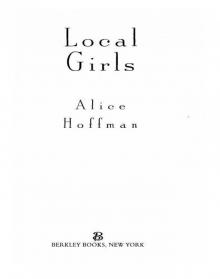 Local Girls
Local Girls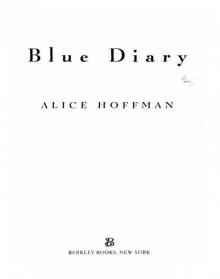 Blue Diary
Blue Diary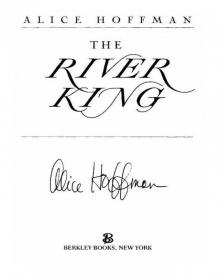 The River King
The River King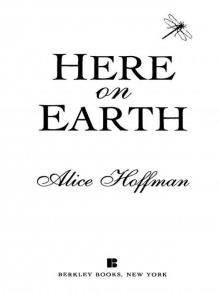 Here on Earth
Here on Earth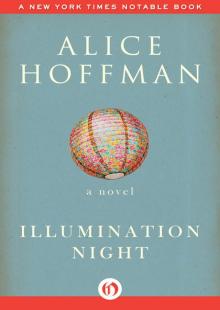 Illumination Night: A Novel
Illumination Night: A Novel The Marriage of Opposites
The Marriage of Opposites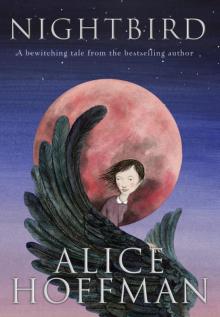 Nightbird
Nightbird Incantation
Incantation Skylight Confessions
Skylight Confessions The Ice Queen
The Ice Queen Second Nature
Second Nature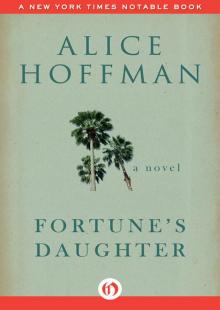 Fortune's Daughter: A Novel
Fortune's Daughter: A Novel Seventh Heaven
Seventh Heaven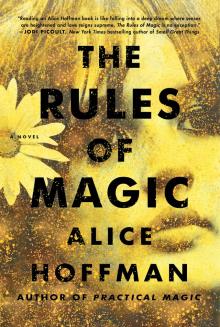 The Rules of Magic
The Rules of Magic The Red Garden
The Red Garden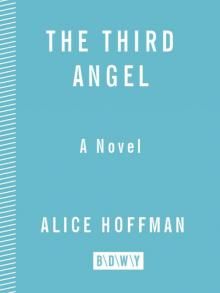 The Third Angel
The Third Angel White Horses
White Horses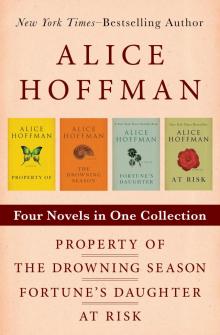 Property of / the Drowning Season / Fortune's Daughter / at Risk
Property of / the Drowning Season / Fortune's Daughter / at Risk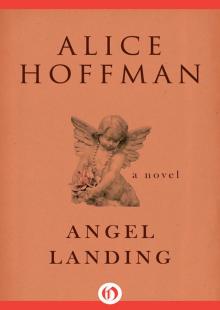 Angel Landing
Angel Landing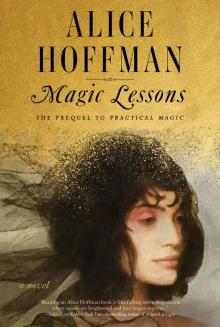 Magic Lessons
Magic Lessons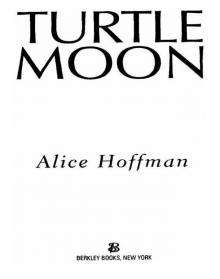 Turtle Moon
Turtle Moon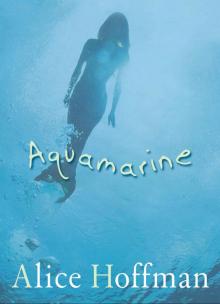 Aquamarine
Aquamarine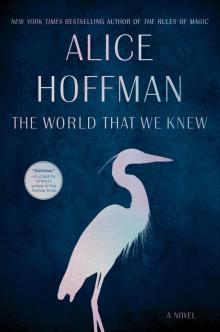 The World That We Knew
The World That We Knew Faithful
Faithful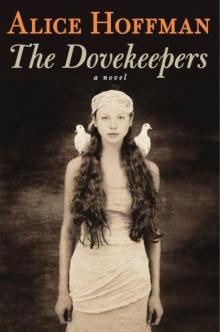 The Dovekeepers
The Dovekeepers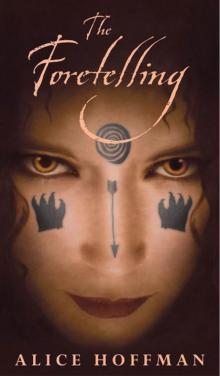 The Foretelling
The Foretelling Green Angel
Green Angel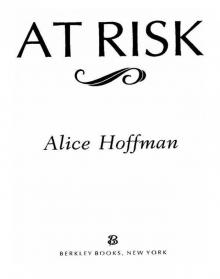 At Risk
At Risk Green Heart
Green Heart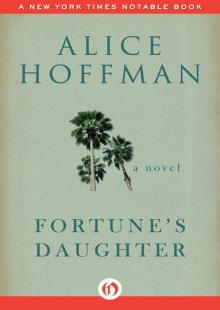 Fortune's Daughter
Fortune's Daughter Faerie Knitting
Faerie Knitting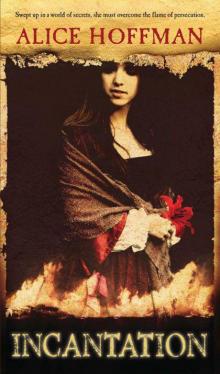 Incantation (v5)
Incantation (v5) Green Witch
Green Witch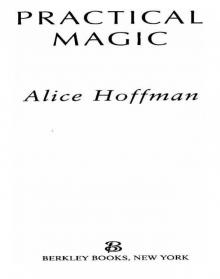 Practical Magic
Practical Magic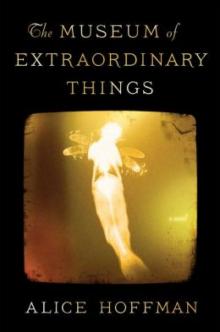 The Museum of Extraordinary Things
The Museum of Extraordinary Things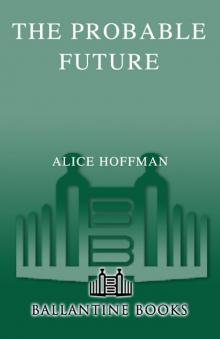 The Probable Future
The Probable Future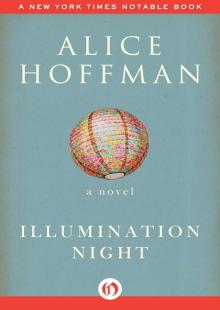 Illumination Night
Illumination Night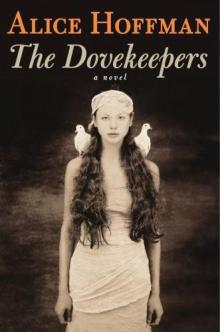 The Dovekeepers: A Novel
The Dovekeepers: A Novel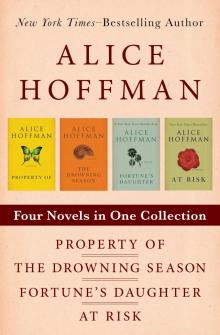 Property Of, the Drowning Season, Fortune's Daughter, and At Risk
Property Of, the Drowning Season, Fortune's Daughter, and At Risk